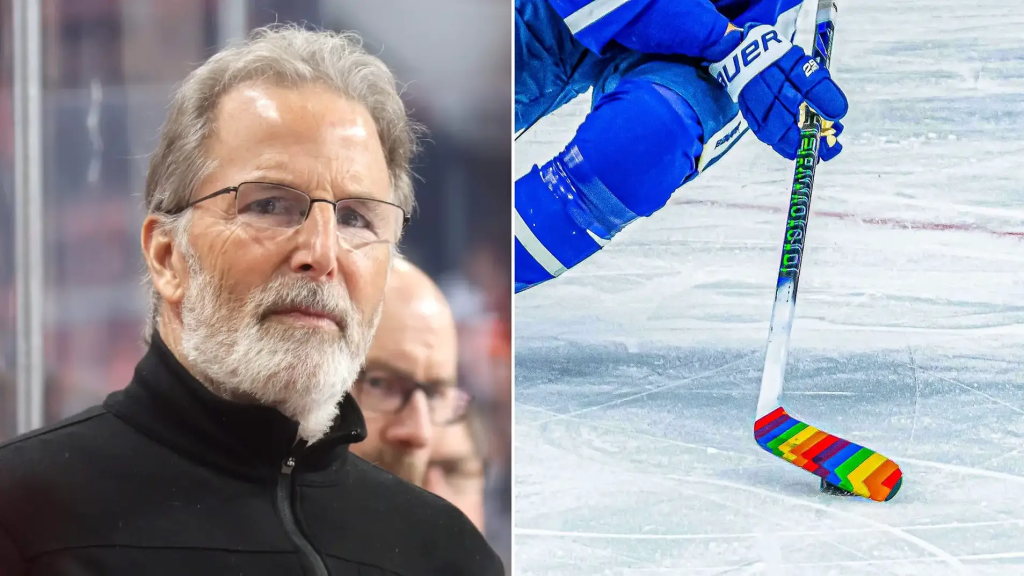In a controversial statement that has sparked a heated debate, Philadelphia Flyers head coach John Tortorella made it clear that his team will not participate in NHL Pride Night celebrations. Tortorella explained that his belief is that the ice should solely be dedicated to the players and their performance, not used as a platform for political or social movements. These remarks, made during a recent press conference, have ignited a wave of discussion within the hockey community and beyond, with many questioning the role of social issues in professional sports and how they should be addressed.

“Ice, man, and woman—those are the only two things I know,” Tortorella stated, a remark that many interpreted as a rejection of the increasingly common trend of integrating social justice issues, including Pride celebrations, into the culture of professional sports. The veteran coach continued to emphasize that, in his opinion, hockey should be about the game itself and the athletes who participate in it, rather than political or cultural movements that, according to him, distract from the core essence of the sport.
Tortorella’s views are not unexpected, as he has built a reputation over his career for being outspoken and unapologetic, especially when it comes to team discipline, player conduct, and his broader vision for the sport of hockey. Throughout his coaching career, Tortorella has been known for making bold, often controversial statements. His latest comments, however, have thrust him directly into the ongoing debate surrounding the intersection of sports and politics. This conversation has become increasingly relevant in recent years, as athletes and teams have become more vocal on social issues, raising the question of where professional sports should stand on these matters.
The NHL, like many other major sports leagues, has been under mounting pressure to take a stance on various social issues, particularly following the rise of movements like Black Lives Matter and LGBTQ+ rights. Over the past several years, numerous NHL teams have participated in Pride Night events, where players wear rainbow-colored jerseys and take part in activities aimed at supporting the LGBTQ+ community. These celebrations are meant to create a more inclusive and welcoming environment for both fans and players, promoting diversity and equality both on and off the ice.
However, Tortorella’s comments reflect a growing sentiment among some in the hockey world that these types of celebrations are unnecessary and may even be detrimental to the sport. In his view, hockey should maintain neutrality when it comes to political and social issues, and allow the game itself to speak for the players and fans. “I don’t need to make a statement on every issue that comes up,” Tortorella added. “I’m here to coach my team and focus on the game. That’s where my attention should be.” His remarks suggest a belief that sports should be an escape from the complexities of the real world, where players can focus on their athletic performance without being burdened by the weight of social or political statements.
Tortorella’s stance has found support among some who argue that professional sports should remain free from the influence of political movements. “The job of a coach is to win games, not push a political agenda,” said one commentator who endorsed Tortorella’s perspective. “Sports are meant to be an escape, not a forum for social activism. It’s refreshing to see a coach who is focused on what really matters—winning and performance.”
On the other hand, Tortorella’s refusal to participate in Pride Night events has also sparked significant backlash from those who argue that sports have an important role to play in addressing societal issues. “Sports have always been a platform for social change,” said one LGBTQ+ advocate. “By refusing to participate in Pride events, Tortorella is sending a message that LGBTQ+ fans and players don’t matter. This isn’t about politics—it’s about inclusion and acceptance.” For these critics, the issue isn’t about promoting a political agenda but rather fostering an inclusive environment that respects and supports all players and fans, regardless of their sexual orientation or identity.
The NHL has made notable efforts in recent years to increase inclusivity, with Pride Night events being held across multiple teams and additional initiatives designed to promote diversity within the sport. The league’s ongoing commitment to inclusivity has been well-received by many, particularly in light of hockey’s historically homogenous nature compared to other major sports. High-profile NHL players, such as Brock McGinn and Travis Dermott, have used their platforms to advocate for LGBTQ+ rights, lending their support to a more inclusive culture in hockey.
However, Tortorella’s comments reflect a broader divide within professional sports, where some coaches, players, and fans believe the growing focus on social issues is distracting from the primary purpose of the game itself. Critics argue that these movements, while important in their own right, take attention away from the sport and could potentially create divisions within fanbases. The debate continues to unfold as more athletes and teams use their public visibility to voice their opinions on a wide array of social and political causes, further intensifying the conversation around the role of activism in sports.
Despite the controversy, Tortorella remains resolute in his belief that the ice should be a place for players to display their skills and compete, rather than a stage for political statements. “We’re here to compete, not to make a statement about every social issue,” Tortorella stated firmly. “If we’re going to focus on anything, it should be how we can improve as a team and win games.”
As this debate continues to gain traction, Tortorella’s refusal to participate in Pride Night events is likely to remain a hotly discussed topic within the hockey world. His comments underscore the broader tension between those who advocate for the use of sports as a platform for social change and those who argue that professional sports should stay above the fray, allowing the game itself to remain the primary focus. While Tortorella’s stance may not align with everyone in the hockey community, it serves as a focal point for ongoing discussions about activism in sports, challenging the industry to find a balance between tradition and social responsibility.


